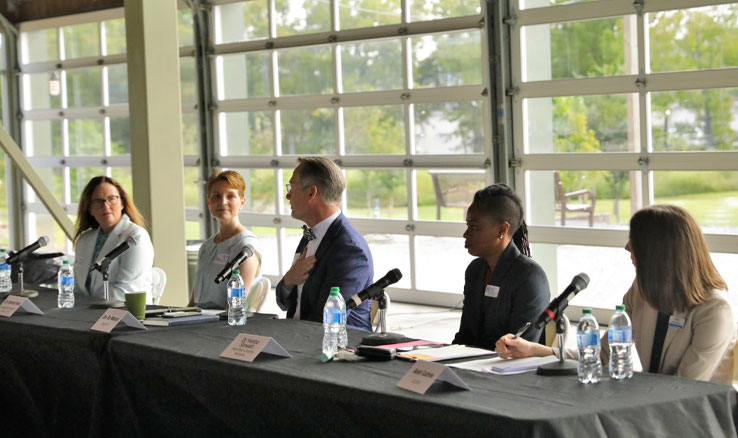Photo Credits: courtesy of Waterhouse Public Relations
The Tennessee Conservative [By Jason Vaughn] –
State Senator Bo Watson (R-Hixson-District 11) held his second annual Literacy Summit in Collegedale last week. He and several other state and education officials talked about the new updates to the Tennessee Literacy Success Act, including the third-grade retention law.
The panel was made up of Watson and four others: Lisa Coons, chief academic officer for the Tennessee Department of Education; Aleah Guthrie, senior director of policy and government relations for Tennessee Score; Deborah Reed, director of the Reading360 Research Center at the University of Tennessee at Knoxville; and Yvette Stewart, director of elementary teaching and learning and K-12 literacy for Hamilton County Schools.

The retention law, which says that all third graders who do not achieve a proficient score on the English Language Arts section of the TCAP test, was a focal point of their conversation at the summit.
The most recent TCAP scores show that nearly two thirds of current third graders in Hamilton County risk retention next year if they do not improve their scores on this spring’s upcoming test.
There are ways that students who do not meet the qualifying score can still move on to the next grade level. The law stipulates that third graders who are approaching proficiency can choose to participate in a summer bridge program or agree to intensive tutoring through the fourth grade. Students who fall significantly below proficiency must participate in both the summer program and the tutoring.
The tutoring program will consist of one-on-one small group instruction for a minimum of three times a week, totaling around 50 hours each semester.
“The tutoring program isn’t about helping kids with their homework,” Watson said. “It is a focused effort on making sure that that child has the foundational skills to learn how to read.”

Some have questioned how schools are going to be able to afford the additional staff required to execute these new programs. Watson is hopeful that community partners will step up to cover some of the costs.
“I started out by saying that government can’t do this alone,” he stated. “And, so, in the audience are a lot of philanthropic organizations who are hearing this discussion who are, I hope, appreciating the gravity of the situation. And I would hope that what we will begin to see is the philanthropic community leaning in.”
The state has already given $4.5 million to United Way to provide tutoring for nearly 3,500 students. The Urban League of Chattanooga is also working to provide tutoring services for Hamilton County students.
The Tennessee Investment in Student Achievement Act, or TISA, will provide districts with additional funding for any third-grade student who is in need of tutoring.
“The taxpayers are providing funding to those nonprofit organizations to help supplement or augment our literacy programs,” Watson stated in a later interview.
According to Stewart, most Hamilton County schools have already started heavy tutoring for students to help them prepare for the TCAP testing in the spring. She says that all schools will have this available by the end of September and that they are already seeing positive results from the existing programs.
“The training that we’ve given teachers to really understand again, how to do this work well, is really paying dividends for us. We are seeing that,” she stated in a post-summit interview.
She did, however, express concern for next fall and how the district will handle the challenge of adequate placements if the number of retained students is high.
“We’ve got to figure that out,” Stewart said. “I mean, this is new legislation. It’s a new way of thinking about what do you do to support kids that are struggling or that need additional support. So, that’s a conversation that we’re having.”

Jeanette Omarkhall, president of the Hamilton County Education Association, was in attendance at the summit. She is concerned that the legislation and the reality of the situation are not going to work well together and recommended that legislators spend more time talking to teachers, who work with these students every day.
“What we’re looking at next year is the potential that we will have overcrowded classrooms,” Omarkhail said. “I just think there’s a lot of moving parts that haven’t moved into their place yet. And because every district in the state is unique, having a cookie-cutter program with no flexibility may hinder that.”
Watson reiterated that the new law was not meant to create burdens that school systems would have to face alone. He again encouraged community organizations to consider the impact of children who were unable to read on the future of society.
“The consequences are a lot greater for society than they are for teachers,” Watson said. “The consequences are huge for workforce development, they’re huge for economic community development. So the consequences of not doing this are much greater.”


About the Author: Jason Vaughn, Media Coordinator for The Tennessee Conservative ~ Jason previously worked for a legacy publishing company based in Crossville, TN in a variety of roles through his career. Most recently, he served as Deputy Director for their flagship publication. Prior, he was a freelance journalist writing articles that appeared in the Herald Citizen, the Crossville Chronicle and The Oracle among others. He graduated from Tennessee Technological University with a Bachelor’s in English-Journalism, with minors in Broadcast Journalism and History. Contact Jason at news@TennesseeConservativeNews.com



